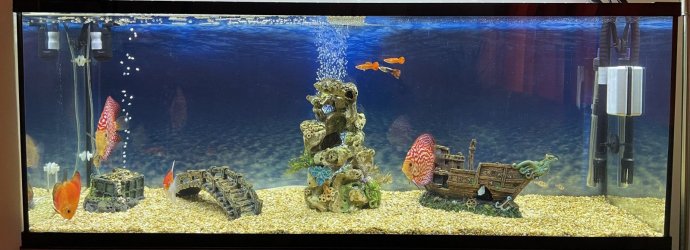G
Guest14017
Guest
Even if a fish is suspected to have Hexamita - you generally remove and treat THAT fish as soon as symptoms present themselves. You get as much mulm and organics out of the tank as possible but you don't hit the entire system with antibiotics. That is just not how Hexamita is usually treated. Hexamita is in most healthy systems, but it is opportunistic, generally only attacking weakened fish and not a threat for strong ones.
Hexamita is very rarely seen outside of cichlids anyway, so slamming the tank with antibiotics when there are tons of other species in the tank doesn't make sense to me from that standpoint either.
And the best form of treatment for Hexamita while the fish is still feeding is this:
 www.monsterfishkeepers.com
www.monsterfishkeepers.com
LINK POSTED FOR THE PURPOSE OF DISEASE TREATMENT - PERIOD!
This should have been recommended when the user presented with the fish and she was still eating. Adding salt isn't going to help, and using metronidazole is okay once the fish is off its feed, but the user should have been informed that it will likely crash the cycle and to carefully manage and monitor his water and parameters.
This user has persistently high nitrates, which will predispose his fish to disease regardless, but this treatment plan had no chance of success as you cannot treat disease by crashing your cycle. But I suppose the point is moot now.
And I guess it's easy enough to just say - "Oh the fish were going to die anyway..."
Hexamita is very rarely seen outside of cichlids anyway, so slamming the tank with antibiotics when there are tons of other species in the tank doesn't make sense to me from that standpoint either.
And the best form of treatment for Hexamita while the fish is still feeding is this:
Treating Hexamita aka Spironucleus
This treatment should work on all species of fish, marine, or fresh, as long as one is treating for hexamita/spironucleus.
LINK POSTED FOR THE PURPOSE OF DISEASE TREATMENT - PERIOD!
This should have been recommended when the user presented with the fish and she was still eating. Adding salt isn't going to help, and using metronidazole is okay once the fish is off its feed, but the user should have been informed that it will likely crash the cycle and to carefully manage and monitor his water and parameters.
This user has persistently high nitrates, which will predispose his fish to disease regardless, but this treatment plan had no chance of success as you cannot treat disease by crashing your cycle. But I suppose the point is moot now.
And I guess it's easy enough to just say - "Oh the fish were going to die anyway..."



